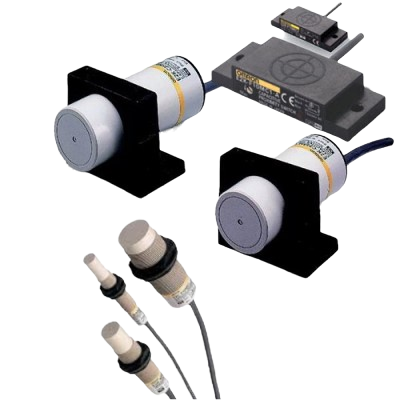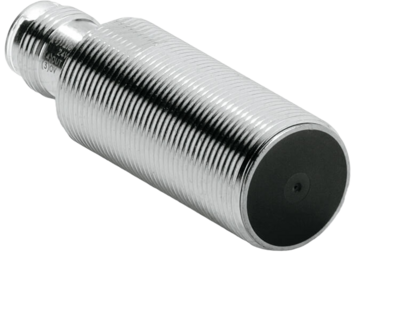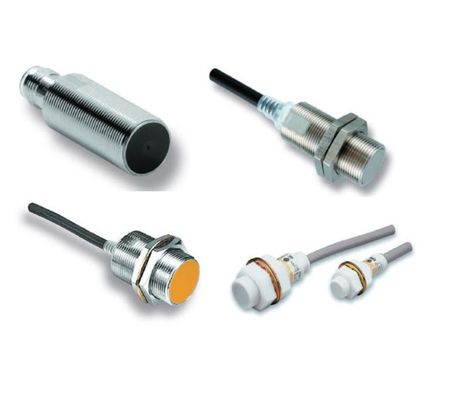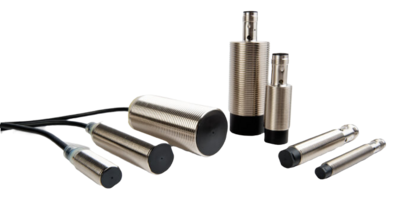Omron Sensors
omron capacitive proximity sensor
- Case size: M8, M12, M18, Ø22
- Body shape: Cylindrical, rectangular
- Mounting type: Threaded, flush, on a bracket
- Material of detecting surface: ABS plastic, stainless steel, PTFE
- Sensitivity: Adjustable or fixed
- Trigger time: 0.2ms (typical)
- Indication: LED indicator
omron e2a
- Response time: 0.2 ms maximum
- Release time: 0.1 ms maximum
Omron e2a m12kn08 m1 b1
e2a m12kn08 wp b1
Omron e2a m12ks04 m1 b1
Omron e2a m12ks04 m1 b2
Omron e2a m12ks04 wp b1
e2a m12ks04 wp b1 2m
Omron e2a m12ks04 wp c1
Omron e2a m12ln08 m1 b1
Omron e2a m12ls04 m1 b1
Omron e2a m12ls04 m1 b2
Omron e2a m18ks08 m1 b1
e2a m18ks08 wp b1
Distance Sensor Omron - e2a m18ks08 wp b1 2m
Omron e2a m18ln16 m1 b1
Omron e2a m18ls08 m1 b1
e2a m30kn20 m1 b1
Omron e2a m30ks15 m1 b1
Omron e2a s08kn04 m5 b1
Omron e2a s08ks02 m1 b1
Proximity sensor
- Type of sensor: Induction
- Body shape: Cylindrical
- Housing diameter: 8 mm
Omron e2a s08ls02 m5 b1
omron e2b
- Humidity: 35% to 95% RH (non-condensing)
- Vibration: 10 G at 200 Hz (maximum)
- Impact: 50 G (maximum)
- Certification: ATEX, IECEx (for potentially explosive areas)
e2b m12kn05 wp b1
Omron e2b m12ks04 m1 b1
Omron e2b m12ks04 m1 b2
e2b m12ln08 m1 b1
- Sensing Distance: 8mm
- Output type: PNP PNP
- Operating mode: NO
e2b m12ln08 wp b1
Omron e2b m12ls04 m1 b1
Omron, an industry pioneer in sensors and industrial automation, offers many benefits to businesses seeking to optimize their operations. One of the key advantages is Omron's commitment to innovation and the constant development of advanced solutions that ensure efficiency and productivity. With a diverse portfolio of sensors, controllers, and robotics, Omron permits industries to streamline procedures, decrease idle time, and boost productivity.
Omnipotence of Omron Sensor Types
Omron sensors catalog an extensive selection of models catering to various industrial applications, each designed to deliver precise and reliable performance. Let's explore some of the key models and provide a brief review of their features and benefits:
- Omron photoelectric sensors: There are numerous models of omron photo sensor, such as retro-reflective, diffuse reflective, and through-beam. These omron photoelectric use light beams to accurately determine an object's presence, absence, or distance. They are ideal for applications requiring long-range detection or sensing in challenging environments with dust, smoke, or other obstructions.
- Omron proximity sensor: These proximity omron are known for their durability and reliability, making them suitable for harsh industrial environments where mechanical switches may fail due to wear and tear.
- Omron ultrasonic sensors: These sensors are versatile and can operate in various conditions, including the presence of dust, smoke, or uneven surfaces. They are commonly used in applications such as level sensing, object detection, and positioning in industries like automotive, packaging, and agriculture.
- Omron vision sensors: The vision sensors from Omron combine image processing technology with built-in algorithms to perform tasks such as object recognition, inspection, and measurement. These sensors offer high-speed and high-precision capabilities, allowing for accurate detection of defects, verification of product quality, and sorting of items on production lines.
- Omron temperature sensor: By providing omron temperature monitor in real-time, these sensors assist companies in preserving ideal working circumstances, averting equipment breakdowns, and guaranteeing product quality.
Optimizing Production with Omron Sensors
With their many benefits that lead to higher productivity, better quality, and increased safety, Omron sensors are essential to improving production processes in a variety of industries.
Here are some key advantages of Omron sensors in manufacturing:
- Monitoring and Control in Real Time: Sensors deliver current information on a range of parameters such as presence, position, and environmental conditions, enabling precise production process control and observation.
- Enhanced Accuracy and Precision: With their high sensitivity and accuracy, Omron Sensors ensure precise detection and measurement of objects, components, or environmental factors.
- Streamlined Automation: Sensors provide smooth integration into automated systems, enabling smooth operation and synchronization of equipment and machinery.
- Improved Safety: Omron Sensors incorporate advanced safety features such as collision detection, presence sensing, and machine safeguarding, ensuring a safer working environment for personnel and equipment.
- Cost Savings: Through waste reduction and process optimization, Omron Sensors contribute to cost savings for businesses.
- Versatility and Adaptability: There are many different models of sensors available and configurations to suit diverse production requirements and environments.
Industries Benefitting from Omron Sensors
Industries benefit significantly from the utilization of Omron Sensors due to their reliability, versatility, and advanced functionalities.
- Manufacturing Industry: Omron Sensors are extensively used in manufacturing plants for automation, quality control, and process optimization. Industries such as automotive, electronics, consumer goods, and machinery manufacturing rely on Omron Sensors for precise detection, positioning, and monitoring of production processes.
- Food and Beverage Industry: In the food and beverage sector, sensors are essential for guaranteeing the quality of products. safety, and compliance with regulatory standards. These sensors are employed in packaging lines, filling machines, and conveyor systems to detect presence, verify labels, and ensure proper sealing, contributing to efficient and hygienic production processes.
- Pharmaceutical Industry: Omron Sensors are vital in pharmaceutical manufacturing for precise dosage control, labeling accuracy, and detection of contaminants. By ensuring adherence to strict quality standards and regulatory requirements, these sensors contribute to the protection of pharmaceutical product integrity and the improvement of consumer safety.
- Logistics and Warehousing: The industry of warehousing and logistics depends on Omron Sensors for efficient order fulfillment, inventory control, and material handling. Sensors are used in automated storage and retrieval systems, sorting machines, and conveyors to detect objects, monitor product flow, and optimize warehouse operations, leading to increased throughput and reduced logistics costs.
- Automotive Industry: Automotive manufacturers leverage Omron Sensors for various applications, including assembly line automation, quality inspection, and safety systems. These sensors enable precise positioning of components, detection of defects, and implementation of collision avoidance measures, contributing to improved production efficiency and vehicle quality.
- Healthcare Sector: In the healthcare industry, Omron sensors are utilized in medical devices, diagnostic equipment, and laboratory instruments for accurate measurement, monitoring, and control. These sensors enable healthcare professionals to perform tasks such as patient monitoring, diagnostic imaging, and drug delivery with precision and reliability, enhancing patient care and outcomes.
- Aerospace and Defense: Applications for Omron sensors can be found in the defense and aerospace sectors for aircraft manufacturing, maintenance, and testing. These sensors are used in aircraft systems, unmanned aerial vehicles (UAVs), and military equipment for position sensing, motion control, and safety monitoring, ensuring operational reliability and mission success.
- Energy and Utilities: To provide a dependable and sustainable energy supply, power plants and renewable energy systems employ them, as well as smart grid infrastructure for condition monitoring, defect detection, and energy efficiency optimization.
For efficient production, selecting the appropriate Omron sensors is paramount. The right choice of sensors can significantly impact productivity, quality, and safety in industrial operations.
If you encounter challenges or have questions regarding the functionality of Omron Sensors, our team of Eltra Trade managers is readily available to assist you. They can offer advice and suggestions based on their experience and understanding of the market to ensure that the finest sensors are purchased for your unique needs.



